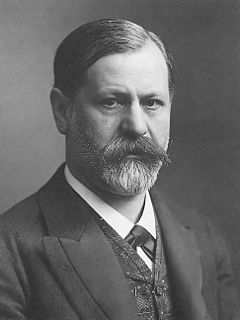Related Research Articles
Perversion is a form of human behavior which deviates from what is considered to be orthodox or normal. Although the term perversion can refer to a variety of forms of deviation, it is most often used to describe sexual behaviors that are considered particularly abnormal, repulsive or obsessive. Perversion differs from deviant behavior, in that the latter covers areas of behavior for which perversion would be too strong a term. It is often considered derogatory, and, in psychological literature, the term paraphilia has been used as a replacement, though this term is controversial, and deviation is sometimes used in its place.
The genital stage in psychoanalysis is the term used by Sigmund Freud to describe the final stage of human psychosexual development. The individual develops a strong sexual interest in people outside of the family.
In psychology and psychiatry, scopophilia or scoptophilia is an aesthetic pleasure drawn from looking at an object or a person. In human sexuality, the term scoptophilia describes the sexual pleasure that a person derives from looking at prurient objects of eroticism, such as pornography, the nude body, and fetishes, as a substitute for actual participation in a sexual relationship.
In psychoanalysis, anticathexis, or countercathexis, is the energy used by the ego to bind the primitive impulses of the Id. Sometimes the ego follows the instructions of the superego in doing so; sometimes however it develops a double-countercathexis, so as to block feelings of guilt and anxiety deriving from the superego, as well as id impulses.
Repression is a key concept of psychoanalysis, where it is understood as a defense mechanism that "ensures that what is unacceptable to the conscious mind, and would if recalled arouse anxiety, is prevented from entering into it." According to psychoanalytic theory, repression plays a major role in many mental illnesses, and in the psyche of the average person.
Anal eroticism, in psychoanalysis, is sensuous pleasure derived from anal sensations. Sigmund Freud, the founder of psychoanalysis, hypothesized that the anal stage of childhood psychosexual development was marked by the predominance of anal eroticism.
In psychology, intellectualization (intellectualisation) is a defense mechanism by which reasoning is used to block confrontation with an unconscious conflict and its associated emotional stress – where thinking is used to avoid feeling. It involves emotionally removing one's self from a stressful event. Intellectualization may accompany, but is different from, rationalization, the pseudo-rational justification of irrational acts.

Repetition compulsion is the unconscious tendency of a person to repeat a traumatic event or its circumstances. This may take the form of symbolically or literally re-enacting the event, or putting oneself in situations where the event is likely to occur again. Repetition compulsion can also take the form of dreams in which memories and feelings of what happened are repeated, and in cases of psychosis, may even be hallucinated.
"Medusa's Head", by Sigmund Freud, is a very short, posthumously published essay on the subject of the Medusa Myth.
Don Juanism or Don Juan syndrome is a non-clinical term for the desire, in a man, to have sex with many different female partners. The name derives from the Don Juan of opera and fiction. The term satyriasis is sometimes used as a synonym for Don Juanism. The term has also been referred to as the male equivalent of nymphomania in women. These terms no longer apply with any accuracy as psychological or legal categories of psychological disorder.
Otto Fenichel was a psychoanalyst of the so-called "second generation".

Freud's seduction theory was a hypothesis posited in the mid-1890s by Sigmund Freud that he believed provided the solution to the problem of the origins of hysteria and obsessional neurosis. According to the theory, a repressed memory of an early childhood sexual abuse or molestation experience was the essential precondition for hysterical or obsessional symptoms, with the addition of an active sexual experience up to the age of eight for the latter.
In psychoanalysis, the primal scene is the initial unconscious fantasy of a child of a sex act, between the parents, that organises the psychosexual development of that child.

Hanns Sachs was one of the earliest psychoanalysts, and a close personal friend of Sigmund Freud. He became a member of Freud's Secret Committee of six in 1912, Freud describing him as one "in whom my confidence is unlimited in spite of the shortness of our acquaintance".

Ernst Simmel was a German-American neurologist and psychoanalyst.
Narcissistic neurosis is a term introduced by Sigmund Freud to distinguish the class of neuroses characterised by their lack of object relations and their fixation upon the early stage of libidinal narcissism. The term is less current in contemporary psychoanalysis, but still a focus for analytic controversy.
Phallic monism is a term introduced by Chasseguet-Smirgel to refer to the theory that in both sexes the male organ—i.e. the question of possessing the penis or not—was the key to psychosexual development.
Creative Writers and Day-Dreaming, was an informal talk given in 1907 by Sigmund Freud, and subsequently published in 1908, on the relationship between unconscious phantasy and creative art.
In psychoanalysis, phallic woman is a concept to describe a woman with the symbolic attributes of the phallus. More generally, it describes any woman possessing traditionally masculine characteristics.
Censorship (psychoanalysis) is the force identified by Sigmund Freud as operating to separate consciousness from the unconscious mind.
References
- ↑ S Freud, Introductory lectures on Psychoanalysis (PFL 1) p. 236
- ↑ Quoted in ‘Screen Memories’ (1899). Standard Edition of the Complete Psychological Works of Sigmund Freud, (3):299-322 (Tr. James Strachey.)
- ↑ G S Reed ed., On Freud's 'Screen Memories' (2014) p. 47 and p. 5
- ↑ Otto Fenichel, The Psychoanalytic Theory of Neurosis (London 1945) p. 145
- ↑ Otto Fenichel, The Psychoanalytic Theory of Neurosis (London 1945) p. 529
- ↑ S Freud, On Sexuality (PFL 7) p. 67
- ↑ G S Reed ed., On Freud's 'Screen Memories' (2014) p. 42